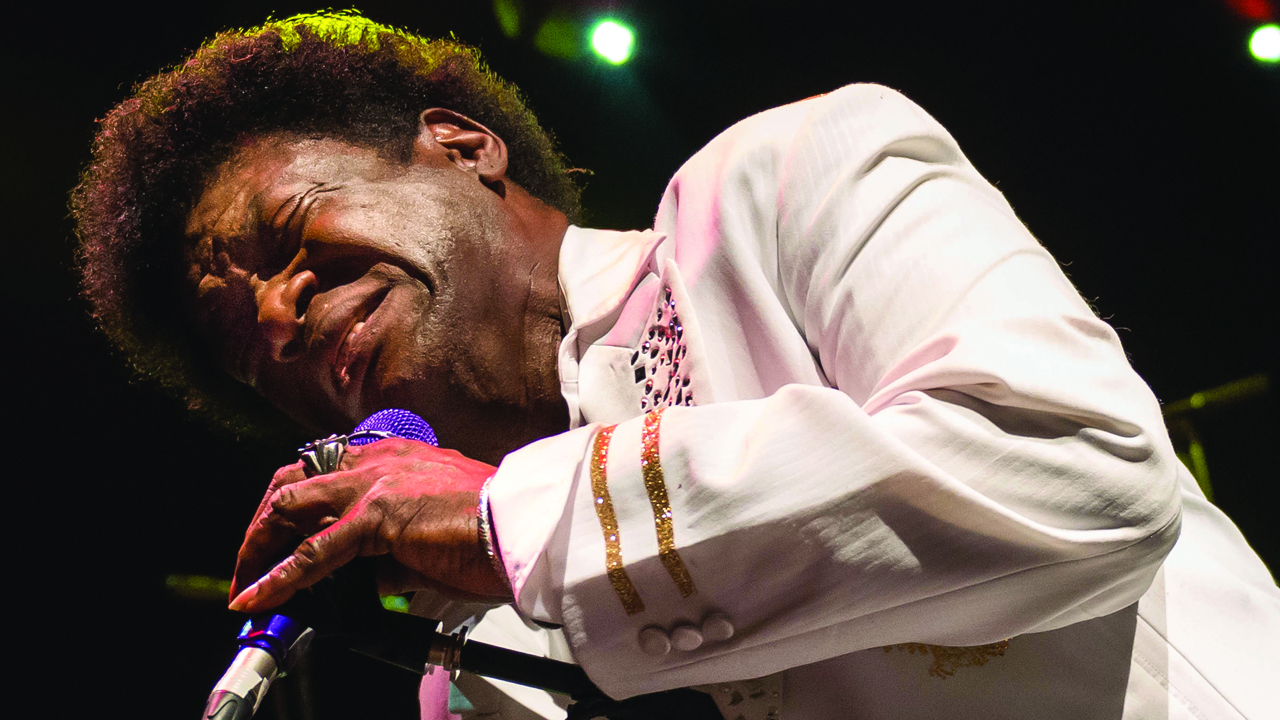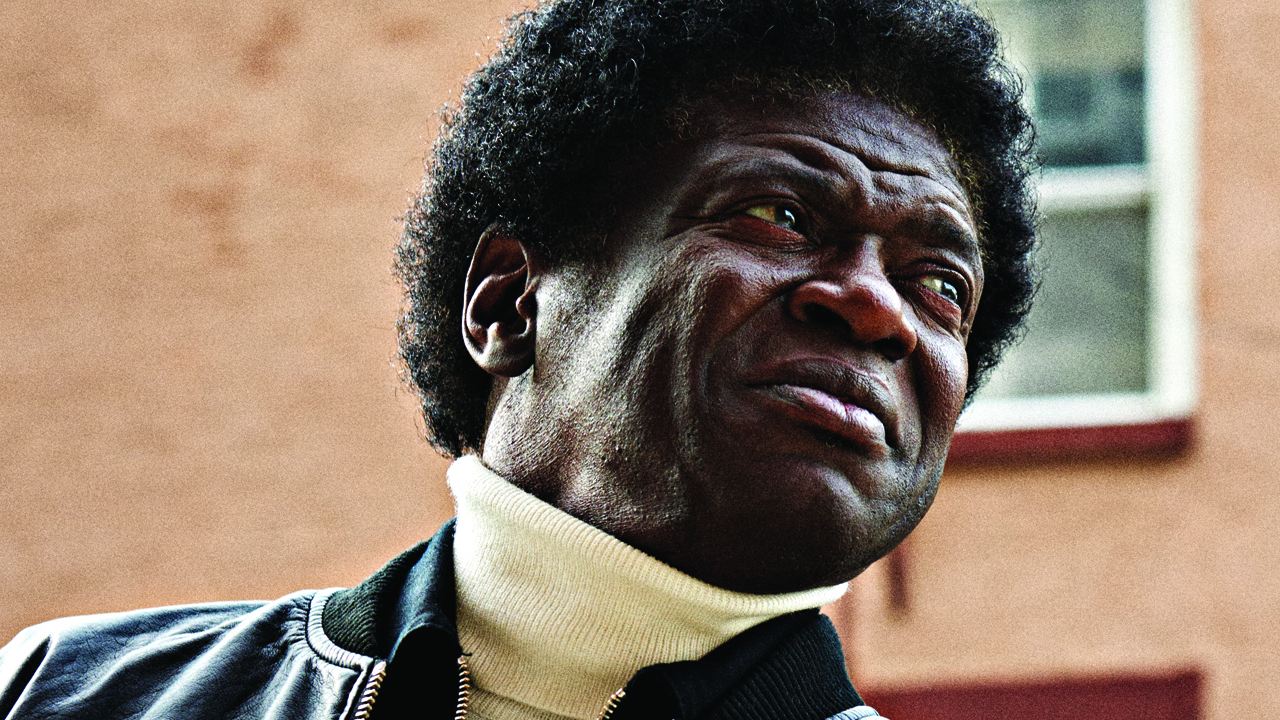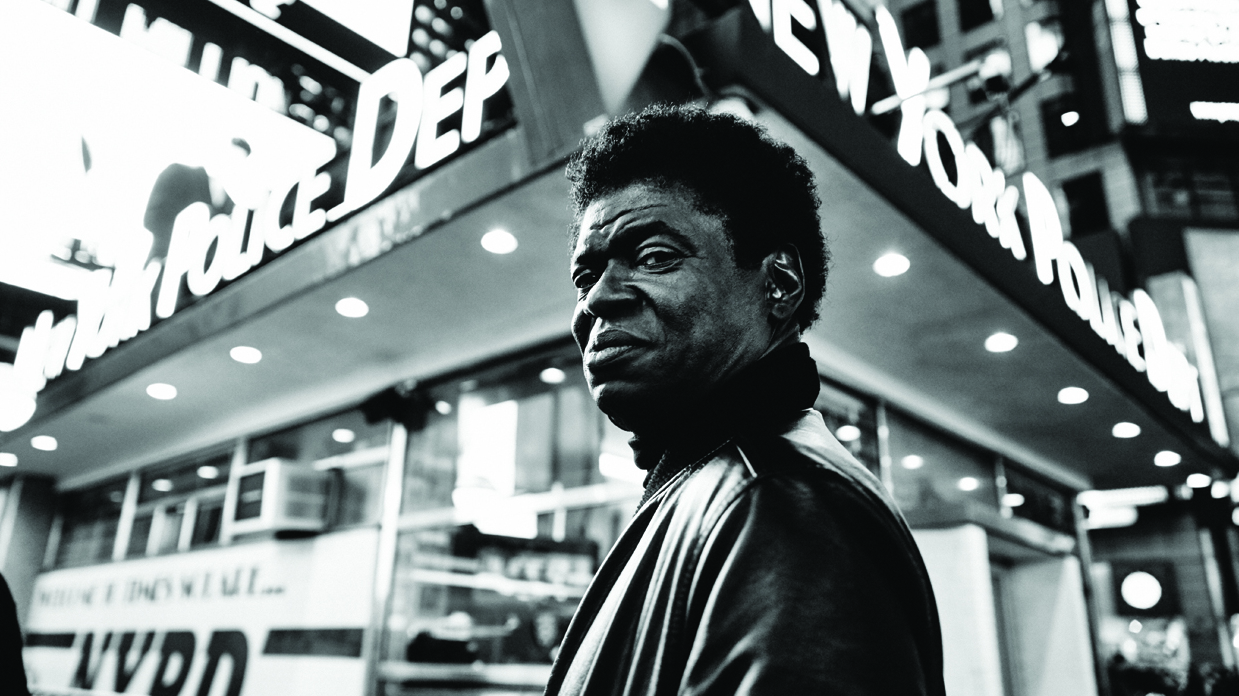Charles Bradley says he can still close his eyes and picture the moment his life was changed forever. “I was 14, my sister took me to see James Brown sing at Harlem’s Apollo theatre. It was amazing, I was in awe, just the way he presented himself on stage, how he looked, how he sang, his energy, his performance, how he gave it his all, from his heart. It touched my inner soul and I knew then I was going to sing. But until then, whatever I did, I was going to give it my all. James Brown showed me the way, he was electrifying.”
Seeing James Brown perform that night is one of just a handful of happy memories the Gainsville, Florida-born, Brooklyn-raised singer has from before he hit fame at the age of 62 with his 2011 debut album, No Time For Dreaming. “Before 62 my life was bitter, after 62 it was bittersweet,” he tells The Blues down the phone from Austin, Texas where he is due to perform later in the evening.
The bitter included living rough and the murder of his brother by his nephew; the bittersweet, finding an audience with songs detailing his pain and heartbreak from such experiences. “It’s difficult sometimes, singing my songs, because they tell my life story which isn’t a happy one. But the good part is that I finally got a chance to record, reach out and express myself to the world.”
While James Brown had his Famous Flames, behind Charles Bradley is the Menahan Street Band, best known for their instrumental track Make The Road By Walking, which was sampled by Jay Z on his 2007 hit single Roc Boys (And The Winner Is). Led by Thomas ‘Tommy TNT’ Brenneck – guitarist, producer and head of Daptone offshoot, Dunham – they not only look to Memphis and Muscle Shoals with their sumptuous southern groove, but to Chicago’s blues scene too.
Bradley, the 67-year-old soul man, meanwhile, has all the marks of the soul greats who have gone before him; the testifying smarts of Syl Johnson, the grit and gusto of Otis Redding, the smoulder and shudder of James Carr, the toughness of Joe Tex and the raw power of James Brown, of course. Together, they make an intoxicating sound, one that’s led to Bradley’s sobriquet, the Screaming Eagle Of Soul. “I’m just trying to give the best to my abilities,” he says humbly.

Bradley’s story is driven by drama and hardship. At eight months of age, his mother left for New York, leaving him in the care of his grandmother. He remembers her with affection. “My grandmother taught me everything,” he says. “She gave me love, told me if I wanted something bad enough, to go for it. It was thinking about her that got me through all the bad times. She said always follow your heart, listen to yourself.” She was a church-goer, but Bradley preferred the blues records he heard in her home.
“The blues got me hooked on music: Robert Johnson, Sam Cooke, Aretha Franklin, Bobby Womack. Music that goes deep inside, music you can feel, with an identity. If you hear Aretha Franklin sing you know immediately it’s Aretha, if you hear Sam Cooke, you know it’s Sam, and James Brown came along and added a rhythm to that blues. And that really got me.”
Then when he was eight, he joined his sister and mother in Brooklyn, and shortly after seeing James Brown, he ran away.
“At home it was chaos. I thought it would be better if I left. I was living on the streets in the day and in the subway trains at night. I was lonely. I found myself in abandoned houses and shelters, I was surrounded by people getting high, I was seeing people shoot up heroin and sniffing glue all day long. It was very hard but I wouldn’t give in to it. I kept strong because of the love of my grandmother. The world doesn’t give a damn, she’d have said, you’ve got to keep strong, keep going, and I did.”
At 16 he enlisted in the federal vocational training programme Job Corps, a government funded training and rehabilitation programme for young people, and they trained him to be a chef. “It got me off the streets and gave me a chance. I ended up in a job in Bar Harbor, Maine.” There he formed his first band. “A guy there told me I looked like James Brown. We formed a band, there were three of us. Our first show we did in nearby Poland Spring. I was scared, I couldn’t go out on the stage and hid behind the curtains. But they pushed me out front and I sang Please Please Please and then I went into I Can’t Stand Myself (When You Touch Me), and the crowd went wild. I loved it.”
Shortly after, though, his band were drafted and Bradley went to work as a cook at a mental hospital in upstate New York – “it was awful” – then headed to California where he settled in 1976 and remained for 20 years. “Like my singing, I put everything into cooking. The people I worked with, they’d always be asking, ‘Is he trying to out-do everybody?’ But I wasn’t, it’s just if I love doing something, I want everyone to feel a part of it – cooking, singing – I want everyone to feel good. I’d be making lamb and pancakes and red potatoes… these rich old ladies and men I was cooking for, they sure liked them and me because of it.”
I was living on the streets in the day and in the subway trains at night. It was very hard but I wouldn’t give in to it.
When James Brown came through to play the Hippodrome in San Francisco, Bradley happened to be working close by. And once more the Godfather of Soul showed him the light.
“I begged him for an opportunity, a chance to make it. He said he could tell by looking at me that I could sing, that I was ready to entertain and that I should go back to New York and try out at the Apollo.”
Back in New York, he moved in with his mother, who in ill health, relied on him to look after her. At the same time, he started to mend their broken relationship. At night, he followed his musical dream, performing under the moniker Black Velvet, his tribute act to James Brown. “I had the hair, the clothes, the moves. I put my soul into being James Brown, I dropped to my knees, I slid across the stage. I knew 58 songs of his that I could do straight off if requested. I always did Try Me, Please Please Please, There Was A Time, It’s A Man’s Man’s Man’s World… No one can do James Brown like I do James Brown. It was like he was up on stage himself.”
It was a lucrative gig too: “I was always in demand, working twice as hard as I do now, playing four shows a night sometimes. I’d be singing across town, then there would be a show in the Bronx, then upstate New York… they had me running around all over.”
It was at one such show at the Tarheel Lounge in Bed-Stuy, Brooklyn, that he was spotted by Gabe Roth, the co-founder of the Daptone label. “He said to me, ‘We already know who James Brown is, we know his songs, we know you can do James Brown, but we want to see some of what you can do. We want to know who you are, show me who Charles Bradley is.’”
Roth put him in the studio with The Sugarman 3, the label’s then house band, and he did just that on his debut single, 2002’s Take It As It Comes, which was the first in a series of funk for the dance floor 45s for Daptone.
His debut album, 2011’s No Time For Dreaming, was a different thing entirely though.
Through Roth, Bradley had met Thomas Brenneck and the pair had an immediate connection. “We used to hang out, talk. I told him my life story and he said, ‘Charles, we’ve got to get this down, we’ve got to tell the world about you.’ That became the motivation for the first album. I went to hear his band rehearse, they would play and I’d make up lyrics on the spot which we would then work on together and turn into the songs on the record.”
Some of his lyrics make for uneasy listening: ‘They don’t hear me cry, they don’t hear me try… I can’t turn my head away,’ he sobs on the anguished, The World (Is Going Up In Flames), his first single with Brenneck’s Menahan Street Band and No Time For Dreaming’s opening track.
Heartaches And Pain, meanwhile, deals with the death of his brother – in 1999 he was awoken in his mother’s house to a tragic scene as his nephew had shot and killed his sibling. The song packs a winding punch. As does the rousing, Why Is It So Hard?, his part-answer record to Sam Cooke’s A Change Is Gonna Come, on which he sighs: ‘Nothing gonna change, everything still remain the same.’
His torment and trouble are almost palpable and the record understandably made waves. Here was classic soul and blues, the kind made in the late 60s but connected to the now due to its hard hitting lyrical edge. For Bradley, it was the first time he had been listened to. “It felt so good,” he says, “to have a record out, to have success. I came to the UK to play some shows and that’s when I knew I had really made it. I was made so welcome, I was shown so much respect and love. I was playing to packed-out audiences, the UK put me on the map.”
His live performance was, and still is, a genuine spectacle and every bit as passionate and engaged as his studio one. A theatrical entertainer, who draws on his experiences as a former JB tribute act, he’s always impeccably turned out in flamboyant cape, jumpsuit or smart suit and gold patent shoes. He drops to his knees, leaps in the air, does the splits – it really does make for bring-the-house-down stuff. As with the likes of Muddy Waters and Howlin’ Wolf before him, though, it took a UK audience’s appreciation to make his home country recognise his talent.
“It’s true,” he says. “My UK success fed back to the US and made them start taking notice of me.”
Since then he’s thrilled audiences at the Coachella festival in California, Glastonbury festival in the UK and Primavera Sound festival in Barcelona, Spain, and he’s also performed at the hallowed Apollo Theatre in New York. “That was amazing,” he remembers, “but then every show is really special to me. I get to give people the love of my soul and they help me open up. It’s a two-way thing. After I walk off stage I like to go out into the audience. I like to talk to them. They’ll be crying, I’ll be crying, they’ll be feeling joy, I’ll be feeling joy, we’ll shake hands, we’ll hug… it’s special.”

His second album, 2013’s Victim Of Love built on the success of his first. Recorded at Brooklyn’s Dunham studios with Thomas Brenneck once more, it deals with more universal themes but is equally spectacular and no less personal; Bradley’s vocals are tough one moment and pleading the next on songs with an emotional sting; see in particular the heartbreaking title track and the aching Let Love Stand A Chance.
His latest album, Changes, meanwhile, might just be his best so far. Here he is at his most emotionally naked and raw on the title track, a cover of the Black Sabbath ballad taken from their 1972 Vol. 4 album. “Thomas played me the song. I didn’t know it, but when I heard the lyric, it really connected with me. My mother had just passed and when I heard the last verse – ‘Now all my days, are filled with tears, wish I could go back, and change these years’ – it really could have been written about my life. It made me think of my mom and the changes in my life since she passed away and I wish I could go back in my life and change a lot of things with her.”
As for what happens next: “People always ask me, ‘Charles, how did you get through it all?’ Well I looked at my life and I saw the clouds ahead of me were deep and dark but I knew I could get through it, because I didn’t want to go back to my past. I’m still dealing with the battle inside me and around me. There’s a part of me I’ve never touched before, and I’m still seeking to know greater things about who I am. I’m experiencing new things, looking at new things – I’m trying to find out what in my life can bring happiness. Music is part of what brings me happiness so I’m going to keep on performing, keep on singing, keep on sharing the love… I know that much for sure.”
Amen to that.
Changes is out now on Dunham.
Charles Bradley & Menahan Street Band: Live From The House Of Soul
